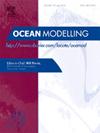基于混沌粒子群优化的混合模型有效波高预测
IF 2.9
3区 地球科学
Q2 METEOROLOGY & ATMOSPHERIC SCIENCES
引用次数: 0
摘要
有效波高的短期预报对海上结构物的运行安全及海上航行具有重要的影响。然而,传统的智能模型在预测非线性情况方面存在局限性。为了提高SWH预测的泛化能力和非线性处理能力,提出了一种混沌粒子群优化(CPSO)与支持向量回归(SVR)模型相结合的混合算法。此外,采用主成分分析(PCA)来减少信息冗余。为了验证所提出的模型的预测性能,测试了几种替代方案,包括单SVR模型,PCA-SVR和PCA-GA(遗传算法)-SVR模型。此外,还比较了PCA-GWO(灰狼优化器)-SVR和PCA-CPSO-SVR模型,以评估GWO和CPSO技术的效果。将CPSO-SVR算法与其他算法进行比较,可以观察到显著的改进。使用平均绝对误差(MAE)、均方根误差(RMSE)和相关系数(R)来评估预测效率。在不同的测试集长度上,PCA-CPSO-SVR模型与基准相比,RMSE降低了54.12%至74.88%。结果表明,混合PCA-CPSO-SVR模型具有较强的泛化能力和较好的非平稳波预测能力。本文章由计算机程序翻译,如有差异,请以英文原文为准。
A hybrid model based on chaos particle swarm optimization for significant wave height prediction
Short-term prediction of significant wave height (SWH) has crucial impacts on operation safety of offshore structures and marine navigations. However, conventional intelligent models have limitations in predicting non-linear situations. This paper introduces a hybrid algorithm combining chaos particle swarm optimization (CPSO) with a support vector regression (SVR) model to enhance the generalization and nonlinear handling capabilities for SWH prediction. Additionally, Principal Component Analysis (PCA) is incorporated to reduce information redundancy. To validate the proposed model's predictive performance, several alternatives are tested, including the single SVR model, PCA-SVR, and PCA-GA (Genetic Algorithm)-SVR models. Additionally, the PCA-GWO (Grey Wolf Optimizer)-SVR and PCA-CPSO-SVR models are compared to assess the effects of GWO and CPSO techniques. Significant improvements were observed when comparing CPSO-SVR with other algorithms. Prediction efficiency was evaluated using mean absolute error (MAE), root mean square error (RMSE), and the correlation coefficient (R). Across different test set lengths, the PCA-CPSO-SVR model reduced RMSE by 54.12 % to 74.88 % compared to the benchmark. These results demonstrate the hybrid PCA-CPSO-SVR model's strong generalization ability and superior predictive capacity for non-stationary waves.
求助全文
通过发布文献求助,成功后即可免费获取论文全文。
去求助
来源期刊

Ocean Modelling
地学-海洋学
CiteScore
5.50
自引率
9.40%
发文量
86
审稿时长
19.6 weeks
期刊介绍:
The main objective of Ocean Modelling is to provide rapid communication between those interested in ocean modelling, whether through direct observation, or through analytical, numerical or laboratory models, and including interactions between physical and biogeochemical or biological phenomena. Because of the intimate links between ocean and atmosphere, involvement of scientists interested in influences of either medium on the other is welcome. The journal has a wide scope and includes ocean-atmosphere interaction in various forms as well as pure ocean results. In addition to primary peer-reviewed papers, the journal provides review papers, preliminary communications, and discussions.
 求助内容:
求助内容: 应助结果提醒方式:
应助结果提醒方式:


